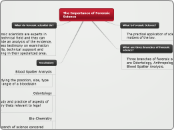SIX PRINCIPLES OF SCIENTIFIC THINKING
Falsifiability
Can the claim be disproved
WHEN MIGHT WE USE IT? A self help book claims that all human beings have an invisible energy field surrounding them that influences their moods and well being.
HOW CAN WE USE IT? We can't design a study to disprove this claim.
Replicability
Can the result be duplicated in other studies?
WHEN MIGHT WE USE IT? A magazine article highlights a study that shows people who practise meditation score 50 points higher on an intelligence test than those who don't.
HOW DO WE USE IT? We should be skeptical if no other scientific studies have reported the same findings.
EXTRAORDINARY CLAIMS
Is the evidence as strong as the claim?
WHEN MIGHT WE USE IT? You come across a website that claims that a monster, like Bigfoot, has been living in the American Northwest for decades without being discovered by researchers.
HOW DO WE USE IT? This extraordinary claim requires more rigorous evidence than a less remarkable claim, such as the assertion that people remember more words from the beginning than from the end of a bit.
Occam's razor
Does a simpler explanation fit the data just as well?
WHEN MIGHT WE USE IT? Your friend, who has poor vision, claims that he spotted UFO while attending a Frisbee tournament.
HOW DO WE USE IT? Is it more likely that your friend's report is due to a simpler explanation - his mistaking a Frisbee for a UFO - than to alien visitation?
Correlation vs Causation
Can we be sure that A causes B?
WHEN MIGHT WE USE IT? A researcher finds that people eat more ice cream on days when crimes are committed than when they aren't, and concludes that eating icecream causes crime.
HOW DO WE USE IT? Eating ice cream (A) might not cause crime (B). Both could be due to third factor (C), such as higher temperature.
Ruling out rival hypotheses
Have important alternatives for the findings been excluded!
WHEN MIGHT WE USE IT? You're reading a newspaper and come across this headline: "Study shows depressed people who receive a new medication improve more than equally depressed people who receive nothing."
HOW DO WE USE IT? The results of the study could be due to the fact that people who received the medication expected to improve.









